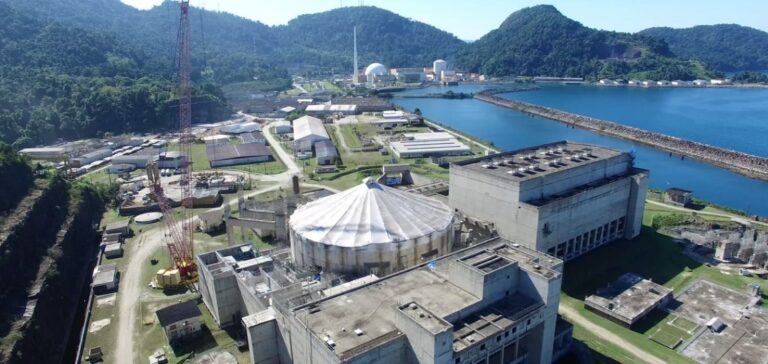Brazilian company Eletronuclear, responsible for operating the country’s nuclear power plants, has unveiled a series of measures to reduce operational costs and ensure the continuation of strategic projects, particularly the construction of Angra 3.
Cost reduction and governance optimization
The restructuring plan, approved by the board of directors in January, will take effect on April 1. It includes the elimination of several management levels and overlapping roles. The number of management positions will be reduced from 116 to 73, generating estimated annual savings of 3 million Brazilian reais (BRL).
Eletronuclear also aims to streamline spending on materials and external services by reassessing contracts and optimizing processes. This strategy seeks to strengthen the company’s economic viability and guarantee the continuation of Brazil’s nuclear energy development projects.
A delayed nuclear project and cost concerns
The Angra 3 project, designed around a 1,405 MW pressurized water reactor supplied by Siemens/KWU, has faced multiple interruptions since its initial launch in 1984. After an initial halt in 1986, construction resumed in 2010, only to be suspended again in 2015 amid corruption scandals.
Work resumed in November 2022, with a commissioning target set for 2026. However, a new dispute between Eletronuclear and the municipality of Angra dos Reis led to another stoppage in April 2023. The disagreement centered on environmental compensation agreements and administrative adjustments related to construction permits.
A strategic economic decision
According to a study by Brazil’s National Bank for Economic and Social Development (BNDES), abandoning Angra 3 would cost approximately 21 billion BRL (3.7 billion USD), an amount equivalent to the sum required to complete the project.
Eletronuclear also highlights the economic and industrial benefits of the project. Angra 3 is expected to supply electricity to 4.5 million people and create up to 7,000 direct jobs at the peak of its construction, in addition to indirect employment generated within the sector. Furthermore, equipment initially intended for Angra 3, valued at an estimated 500-800 million BRL, has already been integrated into Angra 2, optimizing allocated resources.
New timeline set for 2031
Given the accumulated delays, Eletronuclear has adjusted its schedule and now expects Angra 3 to be operational by 2031. This new timeline includes a workforce redeployment strategy, with some employees assigned to the future plant temporarily relocated to the currently operating reactors, Angra 1 and Angra 2, to ensure operational continuity.
Raul Lycurgo, President of Eletronuclear, stated: “This organizational reform allows for a leaner and more efficient model, aligned with good industry practices, without compromising safety and service quality.”






















